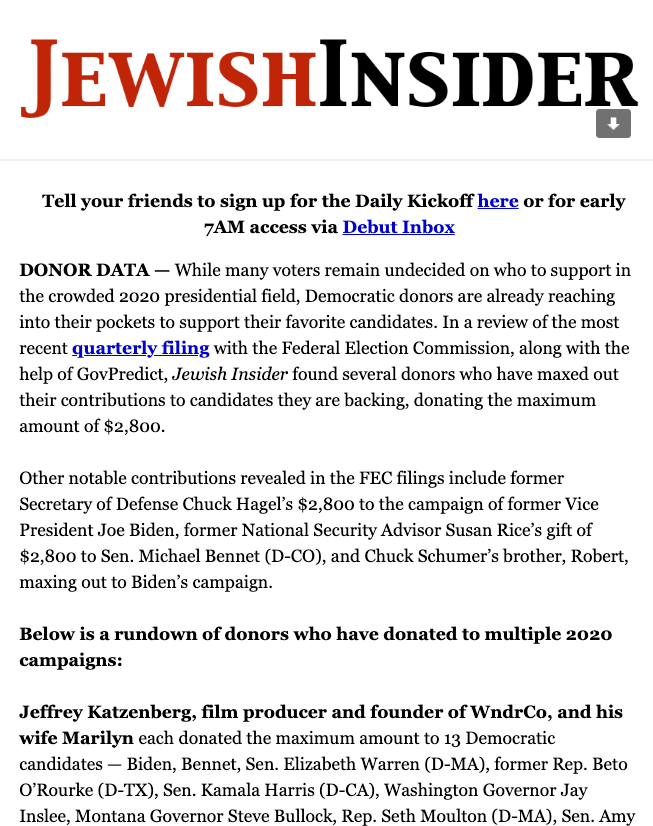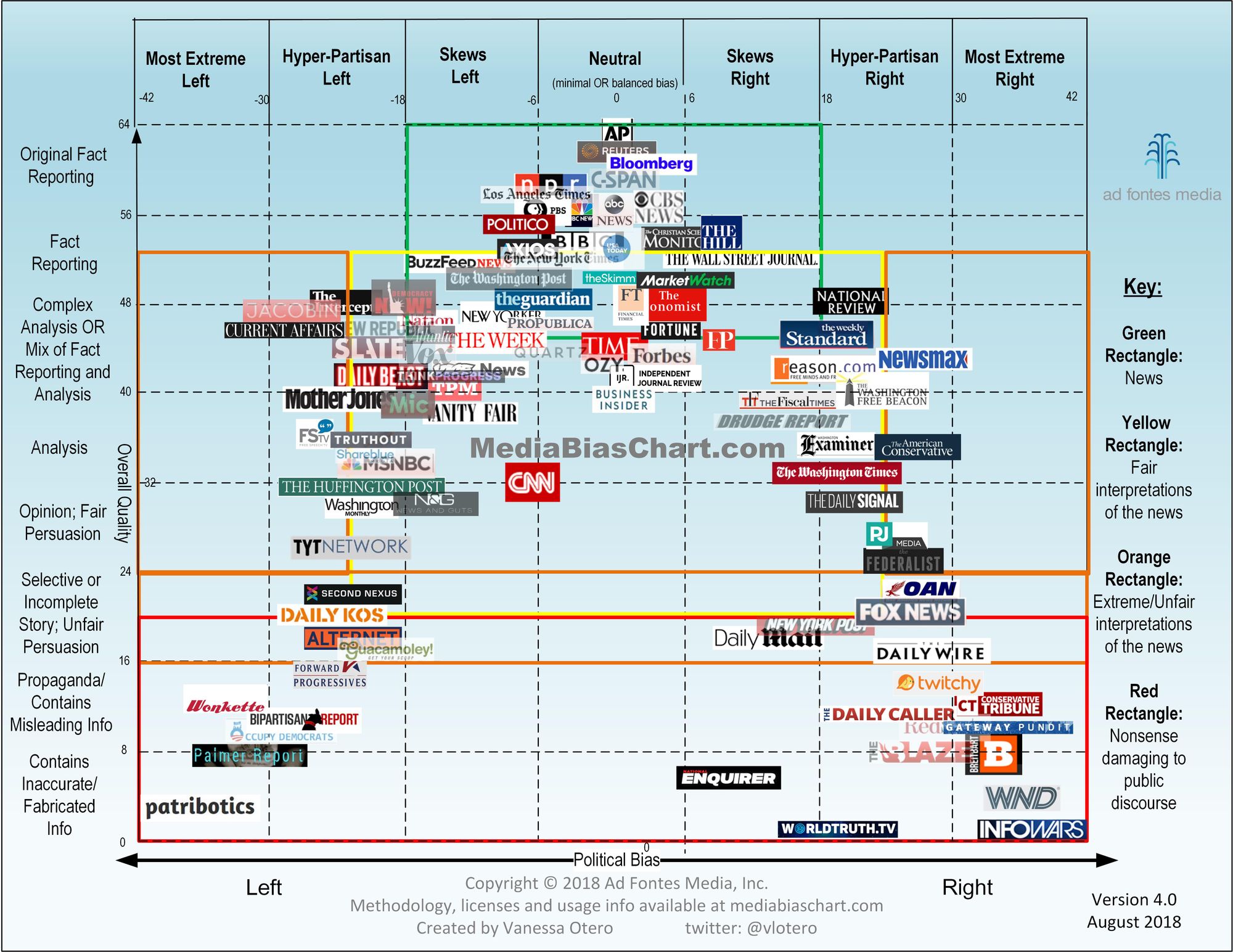Today’s read: 7 minutes
A dangerous tweet, Mayor Pete and one big lie.
What D.C. is talking about.
Joaquin Castro. On Tuesday, the Democratic Texas state representative and brother of presidential candidate Julian Castro posted the names and employers of Trump donors in San Antonio on Twitter. In a tweet accompanying the post, Castro wrote that “their contributions are fueling a campaign of hate that labels Hispanic immigrants as ‘invaders.’” The original tweet below:
What Republicans are saying.
Immediately, conservatives and members of Donald Trump’s re-election campaign began comparing the list to a “hit list.” Many interpreted it as Castro inciting violence against the donors just days after a series of mass shootings that were closely tied to political ideologies. Donald Trump Jr., on Fox News, compared the list directly to the Dayton, Ohio mass shooter’s hit list (Note: While the El Paso and Gilroy shooters were motivated by political ideologies, it’s still unclear if the Dayton shooter was, though he did appear to hold far-left beliefs). Tim Murtaugh, the Director of Communications for Trump’s 2020 re-election campaign, called it a “target list.” The Bulwark, a conservative never-Trump website, published an opinion article calling on Julian Castro, whose election campaign Joaquin chairs, to drop out of the race.
What Democrats are saying.
Most, including Castro, are brushing the criticism off. A very somber Joaquin Castro was interviewed on MSNBC and said his point was not to incite harassment of Trump donors but instead meant as a plea for them to recognize they are funding hatred. Other Democrats have noted that publishing campaign donors is common practice in the news business and don’t feel that Castro crossed any lines. Yashar Ali, left-leaning Twitter star considered one of the most influential people on the Internet and a writer for The Huffington Post, lobbed a criticism at Castro for the tweet.
My take.
During any other week, I’m not sure this would be a big deal. As some have pointed out, it’s pretty common practice for news organizations to publish the donors to certain campaigns. In fact, amidst all the outrage around Castro, I logged into my gmail and opened a morning newsletter from Jewish Insider (a center-right leaning news organization). Here was the top story:

The list goes on for several pages, identifying the places of employment and names of donors to certain campaigns. That being said, it is a bit different for a politician to do this. Generally speaking, a politician’s job is to incite a level of action. A news organization’s job is to inform. The implicit context around Jewish Insider sending out this list is: “here’s what you should know.” The implicit context around Joaquin Castro sending out that list is: “do something about this.” Do I think he’s inciting violence? Of course not. But it’s a fair question to ask what he was expecting his followers to do, and it’s easy to see how some felt it crossed a red line.
Your questions, answered.
Remember: You can reply to this email with questions. Tangle is about repairing the relationship between reporters and their readers. We want to give you the answers you’re looking for.
Q: What is your best explanation for Skews vs Hyper-Partisan divide? It seems like there are a lot of outlets skewing left, but very few that only skew right. I find everything hyper-partisan & beyond on either side exhausting and tribal. Is there some inherent gap in the business model of a media outlet that skews right?
- Aaron, Pittsburgh, PA.
Tangle: This is a great question. For those of you who missed yesterday’s newsletter, Aaron is asking about this graphic we shared:

First, I’ll note something else I’m seeing on this chart. It looks to me like there is a cluster of “skews” and “hyper-partisan” left news organizations in the area of the chart that denotes complex, fact-based analysis. On the right, the more hyper-partisan websites tend to publish selective, incomplete, or outright propaganda and fabricated information. That’s an important part of today’s online media landscape.
In truth, the business model for both worked extremely well a few years ago (when Facebook was making news viral) but does not work very well today. That being said, you are very much onto something when you ask whether there is a business model gap for moderate, lean-right news organizations. The best example of this is The Weekly Standard, a once prolific conservative magazine that recently shut down. TWS took a major hit after the 2016 election, mostly because it refused to coalesce behind Trump. Which is the real key here. Trumpism is driving news organization’s coverage. The old guard of Republicans appears to be dying, and there is very little appetite on the right for conservative, moderate, anti-Trump, pro-establishment news, outside of The Wall Street Journal (which has defended Trump vociferously on multiple occasions). That’s why Fox News has gone further and further to the right, it’s why websites like Breitbart and The Daily Wire continue to gain readers, and it’s why newer outrage-cycle media outlets like The Daily Caller are finding success.
Most people interpret this lack of skewing-right media organizations as evidence of a “liberal bias” in media. Something I’ve been talking about for years, and a belief I think there is a lot of evidence for, is that a liberal bias in media is a total myth. Every news organizations have inherent biases, as this chart shows, but the media is not a monolith leaning left. It may have been 20 or 30 years ago, but it doesn’t exist that way now. The Wall Street Journal and The New York Post are still two of the most circulated papers in the country, and both are decidedly right-wing (more so than The New York Times or The Washington Post leans left). Fox News is by far the most-watched television news network and is further to the right, and further skewed, than any other mainstream source of news. Additionally, all of the top political podcasters and YouTubers, with very few exceptions, are conservative or right-leaning. And all of the aforementioned right-leaning news websites are succeeding. This is probably because — when the media bias did exist — those conservatives migrated to newer forms of media and built out huge followings as the new platforms grew.
In short, I think the balance of liberal-leaning vs. conservative-leaning news and media outlets is quite even, and I think business models for each have thrived (though both are struggling now as Facebook is burying political news). Certainly, of all the business models there are, being a moderate right-leaning news organizations seems like the least profitable (if you aren’t The Wall Street Journal). I wrote a column about the myth of the liberal media bias that you can read here.
Q: Is there any serious scenario where Mayor Pete could win the nomination? And if he does, any chance he could actually win?
- Baru, from Yardley, PA. (Hi, mom!)
Tangle: Mayor Pete is a very, very intriguing candidate to me. I saw him in a live town hall discussion a few months back and was shocked at how charming, original and funny he was. He has a reputation as a nerd but he is personable and can work a crowd. I also think, on paper, he blows some other candidates out of the water in terms of novel electability: he’s the youngest candidate in the race, an Afghanistan war veteran, gay, a Rhodes Scholar, and a Harvard graduate. He can also allegedly speak eight languages (Norwegian, Spanish, Italian, Maltese, Arabic, Dari Persian, and French in addition to English). That checks a lot of boxes across typical party and identity politics loyalties.
That being said, his poll numbers aren’t encouraging. He’s currently polling fifth, behind Biden, Warren, Sanders and Harris, at 5%. He came down a percentage point after the second debate, according to Quinnipiac. Some might say that’s actually an encouraging sign, given he’s a small-time mayor from Indiana who only recently stepped onto the national stage. I think that’s a fair point. It’s also a fair point that he’s got a major uphill battle to take votes from The Big Three: Warren, Sanders and Biden. Why would a far-left Warren or Sanders supporter jump ship to Buttigieg before the primary? Why would a more moderate Democrat leave Biden for him? Those are two important questions to think about. There’s also this: Buttigieg has been excoriated by some on the left for his memoir, his work at McKinsey, and the way he talks about his time in the Navy. Nathan Robinson, the lefty writer from Current Affairs, wrote the most devastating piece on Mayor Pete that I’ve read. You can see that here.
To answer the question more directly: No, I don’t think Mayor Pete has a shot to win the Democratic nomination. That being said, if he did win, I think he would successfully court independents, receive nearly all the liberal votes possible, and beat President Trump in a general election handily. Most people perceive that his sexual orientation would be a handicap, but polls show that’s actually not true. (Americans are more accepting of a gay president than a Muslim president, an atheist president, or a president who has had financial troubles, and about as accepting of a gay president as a mormon president or a president who has smoked marijuana, according to Pew.)
A quick note from a reader.
Jonah from Pasadena, CA, sent in this note about Monday’s newsletter comparing Bernie Sanders and Elizabeth Warren: “A thoroughly insightful piece, however I slightly disagree with using the terminology “free college” to denote what is actually “tuition-free” college. The idea is for it to be taxpayer-funded like earlier public education, fire and police protection, etc. I think the term ‘free college’ leads to right-wing talking points about how there’s no way to pay for it. We don’t refer to police and military protection as “free” so I don’t think the term should be applied here.”
Lie of the day.
Tucker Carlson on Fox News said that white supremacy is “actually not a real problem in America” and called it a hoax. According to Christopher Wray, the Trump-appointed FBI director who testified before Congress a couple weeks ago, that is decidedly untrue. Wray’s words were: “A majority of the domestic terrorism cases that we've investigated are motivated by some version of what you might call white supremacist violence.”
Number of the day.
Tweet of the day.
Presidential Candidate Michael Bennet, the Democratic Senator from Colorado, made a pitch to voters: my presidency would be boring.
A story that matters:
Speaking of white supremacy, an investigative piece of journalism uncovered that a U.S. State Department official working as a foreign affairs officer oversaw the Washington, D.C.-area chapter of a white nationalist organization. He used the pseudonym “Coach Finstock” and wrote things like “[Whites] need a country of our own with nukes, and we will retake this thing lickety split… That’s all that we need. We need a country founded for white people with a nuclear deterrent. And you watch how the world trembles.” You can read more here.
Have a nice day.
An Oregon man accidentally threw away $23,000 of life savings that he kept in a shoebox (in cash). After realizing his mistake, he contacted the local recycling group that had picked up his garbage and begged them to keep an eyes out for the shoebox. Miraculously, amongst tons of cardboard, glass and aluminum, the man’s money was found and discovered (with just $320 missing). You can read more here.
Enjoying this newsletter?
Do me a favor. Forward it to a few friends or send/post this link around on social media: www.readtangle.com
If someone forwarded you this email, you can subscribe by pressing the button below.


